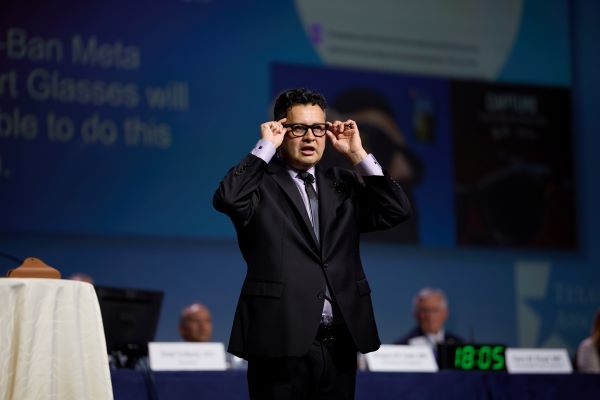
As a Dallas emergency physician, Harvey Castro, MD, began experimenting with ChatGPT – an artificial intelligence (AI) chatbot trained on data from the internet to generate human-like responses to text prompts – in November 2022 after asking himself what he’d “want from AI in a hospital setting.”
He then used ChatGPT’s predictive analytics to automate daily tasks, like generating patient appointment reminders, writing letters of medical necessity, and drafting home care instructions for patients.
Impressed, the ChatGPT and health care strategic adviser realized results stemming from physicians using AI beat both the best human and the best AI models alone. This equation, which he shared when he opened the Texas Medical Association’s 2024 joint TexMed and House of Delegates session in Dallas May 3, became “human + AI > best human > best AI.”
“I see these tools … as a supplement,” Dr. Castro said. “Let’s use this for our patients. Take your knowledge and put it in a large language model.”
The presentation on AI was a response to TMA member interest, as were other AI-centric CME sessions available to members over the three-day event.
Since his original experimentation, Dr. Castro has written multiple books about AI to bridge the gap between technology and medicine and to foster collaboration among physicians.
Additionally, Dr. Castro has aimed to reduce health care burden by developing more than 30 smartphone apps that aid health care professionals, from calculating dosages to helping patients find the emergency room with the shortest wait times.
However, Dr. Castro advised TexMed attendees to not become too reliant upon AI, stating that physicians still need to “double check” the technology, especially as patients turn to “Dr. ChatGPT” instead of real-world physicians.
His warning mirrors TMA’s 2022 AI policy, which outlines AI should be used as an augmented tool set. Whereas artificial intelligence uses internet data to drive its decisions, augmented intelligence is used as an enhancement aid, and defers to human knowledge to craft its responses.
“We need to educate our patients on the good, the bad, and the ugly, and we need to ask AI manufacturers the hard questions, because they may not be forthcoming with those answers,” he told Texas Medicine Today.
Similarly concerned that AI developers would create tools without physician input, Keller pediatrician Jason Terk, MD, a member of TMA’s Council on Constitution and Bylaws, asked Dr. Castro about what guardrails are currently in place to protect physicians during the event’s Q&A session.
“How do we avoid technology outpacing our involvement?” Dr. Terk asked after pointing to challenges associated with AI tools, like bias encoded in algorithms, potential threats to privacy and patient safety, and uncertainty over liability.
To that, Dr. Castro kept his answer simple:
“For better or for worse, this [AI] is coming,” he said. “At the end of the day, we need doctors in the loop.”
TMA CME is here to help physicians understand how AI is being integrated into health care. For more information about office technologies, visit TMA’s Health Information Technology webpage.
And get ready for more engaging speakers at the next of TMA’s valuable in-person meetings, including the Business of Medicine Conference scheduled for October. Read Texas Medicine Today for upcoming details and announcements.
Alisa Pierce
Reporter, Division of Communications and Marketing
(512) 370-1469